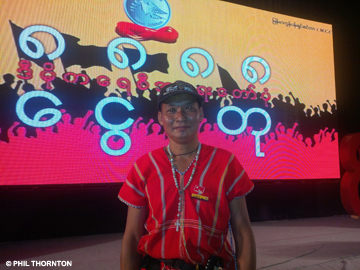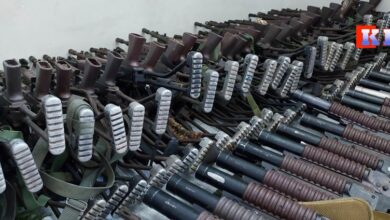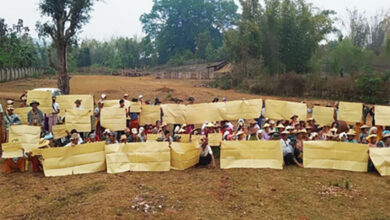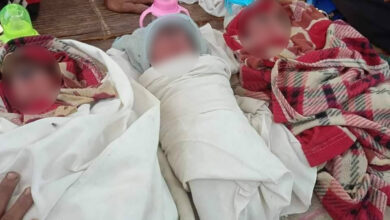88 Generation: The struggle for democracy continues…

More than 5,000 Burmese people turned up at the Myanmar Convention Centre to show their support for the 1988 democracy protest anniversary.
The silver jubilee anniversary commemorating the 8.8.88 uprising that swept through Burma 25 years ago finished today with democracy leaders calling for the struggle for political freedom to continue.
Keynote speakers, including Daw Aung San Suu Kyi and Min Ko Naing, paid tribute to the estimated 3,000 people killed in the 1988 protests and to those activists who continued to struggle for democracy during the last 25 years.
Thousands of people – monks, activists, ethnic leaders, journalists, labor activists, members of the National League for Democracy and members of the public packed Rangoon’s Myanmar Convention Centre.
Those people unable to fit inside the large auditorium to hear the NLD leader, Daw Aung San Suu Kyi speak, watched a large outdoor video screen.
Suu Kyi did not disappoint her audience – they laughed at her witty asides, applauded her political comments and drew silent as she explained what she saw as the three main platforms essential for the country’s future political development.
“We have three policies – 1) Rule of law, 2) National reconciliation and 3) Amend the 2008 Constitution.”
Suu Kyi warned that the country needed to proceed, “during this transition period, with caution. We need to respect our country’s diversity. We need unity. We need to use non violence to reach our goals.”
Suu Kyi paid thanks to the 88 generation and democracy activists who had made great sacrifices. Suu Kyi called for a genuine rule of law to be put in place, stressed that national reconciliation had not happen and drew laughs from the crowd when talking about the constitution.
“It is up to the citizens, if they don’t accept the 2008 Constitution, it should be amended. It is just paper, a book, we should not be afraid of it.”
Former army general and NLD elder statesman, U Tin Oo, spoke to Karen News about the 2008 Constitution.
“This 88 event is a milestone in our democracy struggle, but the struggle for democracy must continue. We have to change the Constitution. It is undemocratic. It was designed to exclude Suu Kyi from politics and the presidency.”
Outside the main auditorium, Kyaw Kyaw has taken three days of work to attend the 88 Anniversary. He explains to Karen News how the events of 1988 affected his life.
“I’m a Shan. I was five at the time, too young to know what was going on, but as I was growing up I heard about it. In 2007, I marched with the monks, but when the soldiers started to fire I ran.”
Kyaw Kyaw said the country has to pull together and to work harder for political reforms.
“We have to have the right development and economic investment. We need a good education system – we need young people to be critical thinkers. I wanted to take part in this event, it is important. It shows there is an openness, but it will take time for reconciliation.”
Kyaw Kyaw said now that his generation has had a taste of freedom they want more.
“We have change, but we have to be in line with the world’s best in education, living standards and political and economic development.”
Kyaw Kyaw explains that he took time off work to attend the three-day 88 Anniversary.
“I’m just a citizen. I have to work for a living. I will need to make up the time I lost when I get back to work.”
Saw Kyaw Win traveled up from Letpadan Town to take part in the 88 Anniversary.
“I am Karen. I was 20 in 88. Today my feelings are the same – we have to strive for true democracy and a genuine rule of law. Today is encouraging, but we have to continue the fight for our rights.”
The three days event included art and photo exhibitions and music.
On August 7, Brad Adams, the Asian Director at Human Rights Watch, called for an inquiry into the 1988 killings. In a statement released yesterday to the media Mr Adams said.
“Burma’s President Thein Sein should commit to an independent investigation and fair prosecutions of officials and commanders responsible for the mass killings of pro-democracy protesters 25 years ago. The mass killings 25 years ago in Burma are an unaddressed open wound that challenges the government’s rhetoric of reform,”
On August 8, 1988, thousands of students, Buddhist monks, civil servants, and ordinary citizens took part in national protests calling for democracy and an end to military rule. The military regime ordered soldiers to fire on protesters, killing an estimated 3,000 and wounding hundreds more.




